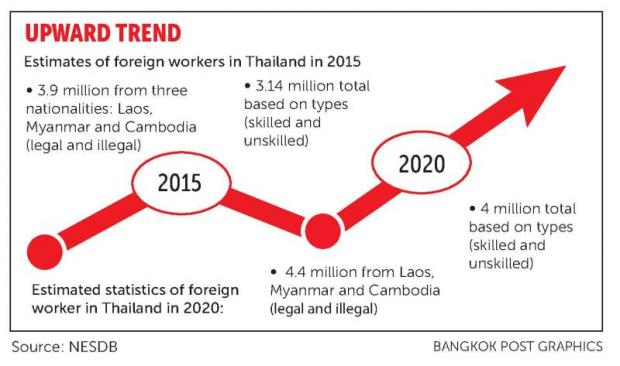
While most of the private sector is crying foul over tightening worker regulations, leading Thai companies say they have seen no effects from the new foreign labour law.
Charoen Pokphand Foods Plc (CPF) said that its business can manage the new law, with none of its migrant workers leaving the company to return to their home countries. Thai Union Group also does not anticipate any negative affects befalling its operations.
Sawang Suksri, CPF's senior vice-president, human resources, said in a statement released yesterday that the company is transparent and complies with international standards when hiring foreign workers.
He said that all migrant workers are treated the same as Thai employees when it comes to welfare benefits, wages and pay rises.
"The new labour law has not had any impact on the company's business operations. At present, CPF employs 8,800 migrant workers, representing 18% of the company's 50,000 employees. Of the total, 6,300 are Cambodian and the rest are from Myanmar. They work in several facilities including animal feed and food processing plants. According to the latest information, no one has returned home [because of the law]," he said.
Shue Chung Chan, head of group human resources of Thai Union Group, said the company legally employs migrant workers, so the company does not anticipate any affects from the law.
"Providing safe, legal and freely-chosen employment opportunities at the company's facilities and supply chains is critically important to Thai Union. The company has implemented numerous initiatives designed to combat modern slavery in the Thai seafood industry and guarantee worker safety, including its business ethics, and labour code of conduct and ethical migrant recruitment policy," said Mr Chan.
Thai Union has taken steps to ensure that its migrant workers are given contracts in their own language, implementing a zero recruitment fee policy and has a strict policy against all forms of discrimination, he said.
Nonetheless, Sangvorn Liptapanlop, president of the Thai Contractors Association, said the new law related to foreign workers had come into force too abruptly, with many businesses that rely heavily on manual labour struggling to adjust.
In the construction sector, there are around 600,000-700,000 foreign workers, of which 70% are working legally.
"The problem is that the registration process is too lengthy and there are too many government agencies to deal with. This causes foreign labour registration delays, and the government should streamline the process," he said.
But Suchart Chantaranakaracha, vice-chairman of labour affairs at the Federation of Thai Industries (FTI), said the tighter labour regulations will hit small and-medium-sized enterprises (SMEs) hard, particularly in the service, agricultural and small-scale retail sectors, which rely heavily on cheap labour.
"At present, the FTI is worried more about the plight of SMEs than large businesses," he said. "We believe it will be a good solution if the government invokes Section 44 to delay enforcement of the new labour regulation for 120 days to provide enough time for employers and foreign workers to register. It would be a good signal to SMEs as well."
The FTI is scheduled to discuss the issue with the Joint Standing Committee on Commerce, Industry and Banking today, said vice-chairman Kriengkrai Thiennukul.